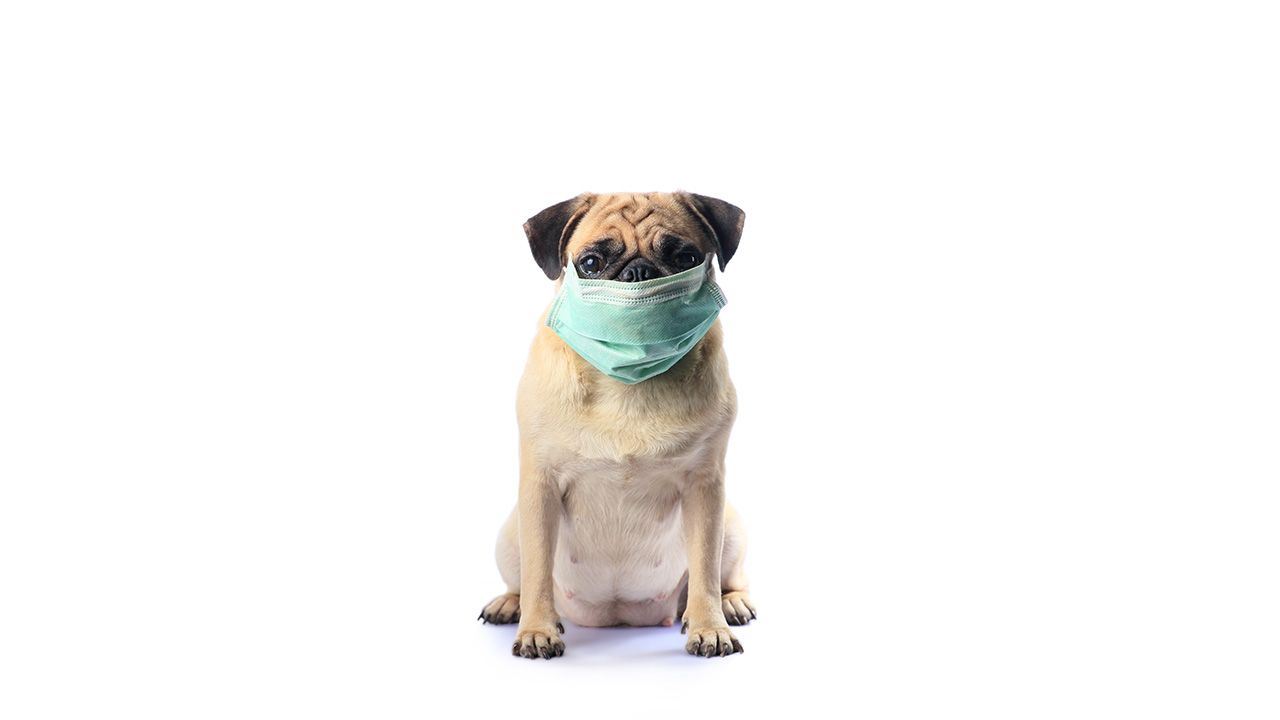As the novel coronavirus pandemic sweeps across the globe, many are not only concerned about their own well-being, but that of their dogs, cats, and other pets. Viral images on social media of dogs wearing face masks have added to the panic. How concerned should we really be about our pets contracting or spreading the novel coronavirus? Things change all the time, so for the most updated information be sure to check the World Health Organization website. In this article we’ll take a deeper look at what we do know right now about COVID-19 and companion animals.

Can dogs and cats get or transmit the novel coronavirus?
This specific coronavirus, also known as COVID-19, is not believed to be a threat to companion animals, including cats or dogs. Keep in mind that “coronavirus’ is a family of viruses. Canine coronavirus, an intestinal infection, is not that same as COVID-19. COVID-19 is transmitted through droplets, such as when someone sneezes, coughs, or speaks. It is highly unlikely for your cat or dog to become infected, or become a carrier. The World Organization for Animal Health has stated that “there is no evidence that companion animals can spread the disease.”
Have there been confirmed cases in dogs or cats?
There has been one confirmed case of a Pomeranian in Hong Kong testing “weakly positive” for the coronavirus. The 17-year-old dog died on March 16th, after apparently having recovered from the disease and returned to its owner. The dog was in close contact with a human who was infected with the virus, but the dog showed no actual signs of the disease.
At this point there are no reported cases of COVID-19 in dogs or cats anywhere else in the world, including hotbeds like Italy, and no sudden upsurges in questionably ill animals.
What are the symptoms of COVID-19 in Cats and Dogs?
Since there is only one reported case of a dog with COVID-19 and the dog did not develop any symptoms, it is still unknown.
How concerned should we be?
On this topic, all reputable sources share the same stance. It’s extremely unlikely for your dog or cat to contract or transmit the virus.
Something TO be concerned about
Something that loving pet parents should be concerned about is how your animal will be cared for if you contract the virus. In Wuhan, thousands of animals have been abandoned and are at risk of dying after people have evacuated their homes. Because of unfounded fears that dogs can transmit coronavirus, some city officials in China have even threatened to kill cats and dogs found outside unattended.
Animal shelters across the globe are having to deal with an increase of dogs and cats, as well as fewer visitors and resources. If you’re considering getting a pet, now may be the perfect time to foster a dog or cat from your local shelter. Who says you need to self-isolate alone?
How can I protect my dog or cat from the coronavirus?
Although it’s not recommended that you order a custom face mask to protect your canine companion, there are some things you can do to protect your pet. Healthy pet owners don’t need to do anything beyond basic hygiene precautions, like washing your hands frequently. If you have coronavirus, it’s advisable to place your dog or cat under someone else’s care for 14 days. If that is not possible, you should follow the same rules you would with a family member under the same roof. Here are some steps you can take to protect your pet:
- Maintain distance
- Make alternate plans for care
- Wear a mask
- Wash your hands before and after you come into contact with them
- Keep them away from other humans and animals
- Don’t snuggle, kiss, or get licked by your pet
- Don’t share food with your pet
How can I care for my pet while under quarantine or self-isolation?
Continuing to care for your pet’s basic needs while under quarantine may require some planning ahead. While most cats and dogs around the world are having the times of their lives with their owners stuck at home for two or three weeks, not being able to leave the house presents some challenges for pet parents. Here are four ways you can stay on top of their needs.
Grooming
Staying in quarantine may mean skipping out on your furry friend’s grooming appointment. If you’re considering grooming your dog or cat at home for the first time, silent clippers are a great way to ease anxiety. The Scaredy Cut Silent Pet Grooming Kit is available on Amazon and can be delivered straight to your front door. In response to the coronavirus outbreak, Amazon is hiring 100,000 new employees, so there shouldn’t be delays. Not only is it a great way to keep your beloved pet feeling great, but it gives you a chance to bond and learn a new skill.
Healthcare
If possible, stock up on any medications your cat or dog may need before you go under quarantine. If you notice a change in your pet’s health, call your veterinarian.
Pet Food and Supplies
If you were unable to stock up on pet food and supplies, ask a friend who is not under quarantine to deliver some, or order it online.
Exercise
If you have coronavirus, unfortunately outdoor excursions to public areas with your pup are off the table. If you are stuck inside the house, you can keep your dog or cat stimulated with toys, training, and exercise however possible. If you are simply self-isolating but not showing any symptoms, you can take your dog for walks as long as you maintain distance from other people.
Conclusion
In conclusion, of all the things to worry about, our dogs and cats getting sick and spreading coronavirus is not one of them. Many pet owners are appreciating now more than ever having animals at home to keep them company.

